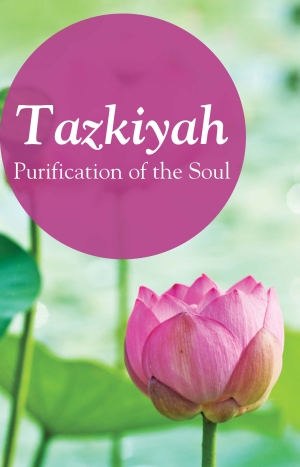The Islamic mission essentially is the tazkiyah (purification) of the individual. The target Islam gives to every person should develop his thinking process to discover God, understand His Creation Plan and spiritually develop a purified personality fit for inhabiting eternal Paradise. God has created man with great potential, and this potential of the human personality is actualized by tazkiyah. In this sense, it would be fitting to call it the building of the human personality on a divine foundation. When a person accepts faith, he has started the journey of tazkiyah. Gradually, he becomes a purified soul or an intellectually and spiritually developed personality. This is the man who will gain entrance into the eternal Paradise of the Hereafter.
Tazkiyah is the Islamic name for deconditioning and purification of the mind, which must be undertaken continuously until the end of one’s life. Deconditioning of the mind can only be done by one process alone: introspection. This is a continuous, merciless examination of ourselves to improve. This improvement can come in two ways. One is to accept the harsh criticism of others by acknowledging their external ‘hammering’ with an open mind, without being offended. The other method of deconditioning can be called ‘self-hammering’, which is to look at ourselves with a critical eye, perceive every mistake with severity, and then introspect by mercilessly ‘hammering’ ourselves without giving ourselves any concession in any matter. Instead of accusing others, we should carry out an objective analysis of ourselves and find our faults. We can develop our personality on positive lines by either accepting the ‘hammering’ of others or by becoming our own worst critic by ‘self-hammering’. One who can perform continuous tazkiyah will develop a purified personality.
Featured Articles
Featured Videos
FAQs
Tazkiyah literally means growth, one example of which can be seen in the tree. A tree is the result of the growth of a seed. When a seed finds a favourable environment, it starts growing until it becomes a green, verdant tree. The same is true of the purification of a human being. In this sense, Tazkiyah also covers intellectual development.
God has created a person with great potential, and this potential of the human personality is actualized by Tazkiyah. In this sense, it would be right to call it the building of the human personality on a divine foundation.
When a person discovers and realizes faith, he has in actual fact, started the journey of Tazkiyah. Gradually, he becomes a purified soul or an intellectually and spiritually developed personality. This is the person who will gain entrance into the eternal Paradise of the Hereafter.
There is nothing mysterious about Tazkiyah. Tazkiyah can be attained, not through meditation but through contemplation and reflection. This entails pondering over or thinking about oneself and the universe, and receiving intellectual sustenance for God-realization. This is the process which results in a purified personality. There is nothing abstract about Tazkiyah. It is a known reality. Tazkiyah is the result of a struggle on the part of the individual. It is not at all related to any mysterious inspiration from some supposedly saintly person.
Source: Discovering God
Tazkiyah or purification, is a Quranic term. The Quran tells us that tazkiya is the means for human salvation (91: 9-10). According to the Quran (20: 76), only those people will be admitted to the world of Paradise who have purified themselves in this world.
The literal meaning of tazkiya is ‘purification’. Just as iron ore passes through various difficult stages and finally acquires the shape and form of a useful machine, a human being’s character passes through difficult stages and emerges as a purified soul.
What are these difficult stages? These stages are when we are faced with unwanted conditions. These unpleasant conditions are the situations that we need to pass through in order to develop our character. When our ego gets a beating and yet we remain firmly established in justice, when we feel angry but control our anger, when we get some position of honour but still remain modest, when we feel the fire of revenge burn within us but douse out the flames inside, when we experience hatred towards someone but still retain concern for his wellbeing, when we acknowledge others even though we are not compelled to, are a few examples of situations that serve to purify us. These are opportunities for our tazkiya. They build within us a lofty character.
Unpleasant conditions are the situations that we need to pass through in order to develop our character. Such opportunities cannot arise in normal conditions. They arise only in abnormal situations. According to the Quran (41: 35), in this examination, only those people succeed who are patient.
Source: Spirit of Islam June 2016
Complex-free soul is one which is free of all forms of negative thinking - prejudice, hatred, enmity etc. He who is able to free his mind of such thoughts is complex free. To make one free is not a mysterious formula, it depends on the act of introspection and contemplation. The following verse in the Quran, “An nafsul mutmayinna.” (89:27)
This verse says how man becomes complex-free. If God gives favour to man, he thinks he is superior. On the other hand, when God withhold something which man has wanted he thinks he has been let down [89:15-16]. Both thinking are wrong. Man should be able to acquit him of both these thinking, only then will he be complex free.
The real means of attaining the ends of tazkiya is for man to reflect on the signs of God, activate his thinking, and through continuous reflection or pondering, discover the deeper realities of things. Tazkiya means preparing oneself with regard to the Hereafter, that is, developing in oneself those qualities which will benefit one in the Hereafter. The way of Tazkiya is to activate one’s thinking. One way to do this is to identify such incidents in one's life when one was going to be plunged into some great trouble but was saved by the special succour of God.
It is a must for the seeker of Tazkiya to recall such incidents repeatedly in order to refresh the mind of how, when he had reached the very brink of destruction, was saved by the special intervention of God. He should keep remembering every graphic detail of these incidents and beseech God thus: “O God, you have repeatedly saved me from the horrible consequences of my actions in the life of this world. In the same way, save me from the horrible punishment of hell in the Hereafter.”
Source: Spirit of Islam July 2016











